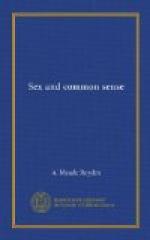VI
A PLEA FOR LIGHT
Jesus said: “If
any man walk in the day, he stumbleth not,
because he seeth the
light of this world. But if a man walk in
the night, he stumbleth,
because there is no light in him.”
My last address for the present[C] on the difficult questions that we have been considering here, Sunday after Sunday, is a plea for light.
[Footnote C: Another address was added a few weeks later in response to urgent requests.]
“Walking in darkness” has been, in sexual matters, the experience of most of us. Even now, in the twentieth century, it is not too much to say that most of us have had to fight our battle in almost complete darkness and something very near to complete isolation.
There are two great passions connected with the bodies of men and women, so fundamental that they have moulded the histories of nations and the development of the human race. They are the hunger for food and the instinct of sex. There is no other passion connected with our bodies so fundamental, so powerful, as these two; and yet, with regard to the second, most of us are expected to manage our lives and to grow up into maturity without any real knowledge at all, and with such advice as we get wrapped up in a jargon that we do not understand. We have been as those who set out to sea without a chart; as soldiers who fight a campaign without a map. I do not think this is too much to say of the way in which a large number of the men and women that I know—even those of this generation—have been expected to tackle one of the greatest problems that the human race has to solve.
May I sketch what I imagine is the experience of most people? At some point in our lives we begin to be curious; we ask a question; we are met with a jest or a lie, or with a rebuke, or with some evasion that conveys to us, quite successfully, that we ought not to have asked the question. The question generally has to do with the matter of birth—the birth of babies, or kittens, or chickens; some point of curiosity connected with the birth of young creatures is generally the first thing that awakens our interest. When we meet with evasion, lies, or reproof, we naturally conclude that there is something about the birth of life into the world that we ought not to know, and since it is apparently wrong of us even to wish to know it, it is presumably disgusting. We seek to learn from other and more grimy sources what our parents might have told us, and, learning, arrive at the conclusion that in the relations of men and women there is also something that is repulsive. And since, in spite of this, our interest does not cease but becomes furtive curiosity, we also conclude that there is something depraved and disgusting about ourselves.




